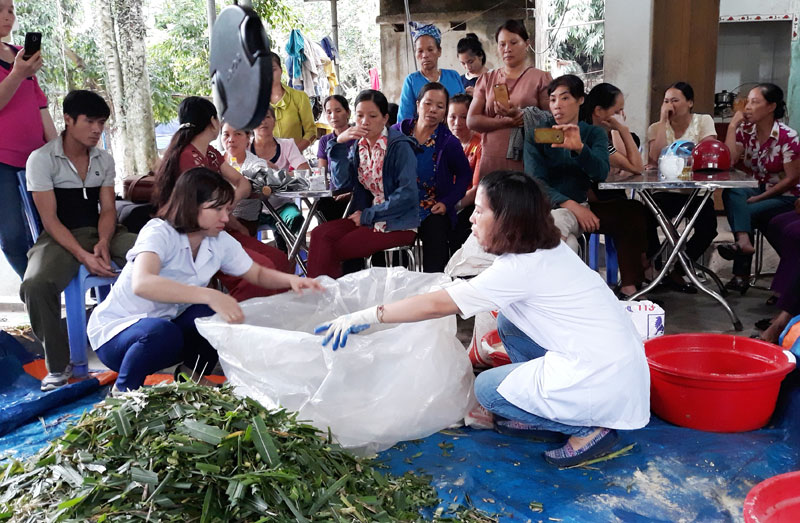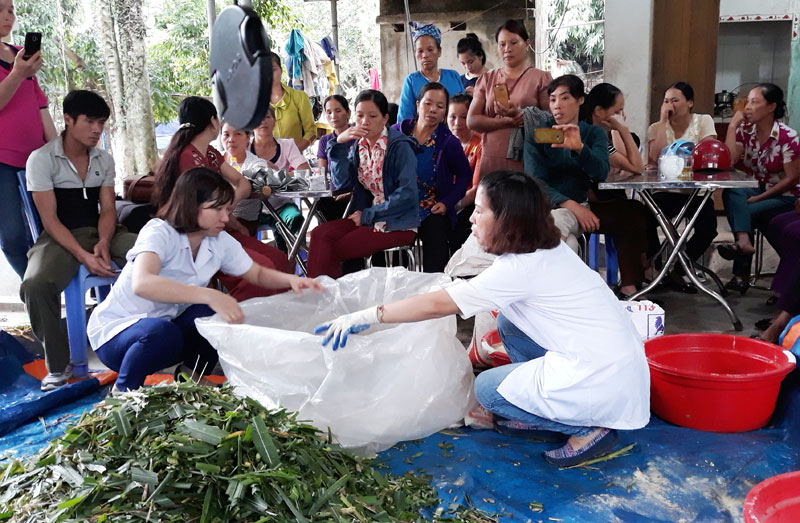
(HBO) – Hoa Binh province defined key areas for investment, considering it as an important orientation to help the agriculture sector effectively develop agricultural expansion encouragement activities over the past 25 years. This is also a drastic direction of the provincial People’s Committee when it approved the "major agricultural expansion encouragement during 2016-2020” project.
Photo: Staff of the provincial Agricultural Expansion Encouragement Centre instruct farmers in Vinh Tien commune, Kim Boi district, how to mix raw food to improve the efficiency of local husbandry farming.
Under the agricultural expansion encouragement project for the 2016-2020 period which is carried out at a total cost of some 200 billion VND, the Department of Agriculture and Rural Development recommended the provincial People’s Committee to pay due attention to prioritised projects, making investment in the sector become a driving force in each production fields.
Investment capital has been injected into five programmes, including citrus tree development, safe vegetable cultivation, soil improvement, enhancing quality of sugarcanes and seedling production.
Regarding the husbandry sector, developing local cattle and poultry in companion with building brands, developing intensive farming of grazing livestock, and developing beekeeping farms are three prioritised projects.
Meanwhile, the province has given priority to expanding aquaculture in reservoirs. For the forestry sector, advanced technologies in varieties and production techniques will be applied to expand farming areas of large-scale forest and non-timber forest products.
Since its establishment, the local Agricultural Expansion Encouragement Centre has built more than 2,000 farms using high technologies, organised over 15,000 training courses for nearly 400,000 cadres and farmers. In addition, over 700 fact-finding tours and seminars were held, drawing the participation of some 10,000 people. The centre has also accelerated communication on the mass media./.
According to data from the Hoa Binh Provincial Party Committee, the industrial production index for the first six months of 2025 is estimated to have increased by 20% compared to the same period last year. This marks the highest year-on-year growth rate for this period since 2020.
In the first six months of 2025, Hoa Binh province’s export turnover was estimated at 1.145 billion USD, marking an 18.11% increase compared to the same period in 2024. Import turnover was estimated at $ 804 million, a 17.15% increase, which helped the province maintain a positive trade balance.
The lives of the ethnic minority farmers in Tan Lac district have gradually improved thanks to the new directions in agricultural production. This is a testament to the collective strength fostered through the professional associations and groups implemented by various levels of the district’s Farmers’ Union.
With the motto the "product quality comes first,” after nearly one year of establishment and operation, Muong village’s Clean Food Agricultural and Commercial Cooperative, located in Cau Hamlet, Hung Son Commune (Kim Boi district), has launched reputable, high-quality agricultural products to the market that are well-received by consumers. The products such as Muong village’s pork sausage, salt-cured chicken, and salt-cured pork hocks have gradually carved out a place in the market and they are on the path to obtaining the OCOP certification.
In the past, the phrase "bumper harvest, rock-bottom prices" was a familiar refrain for Vietnamese farmers engaged in fragmented, small-scale agriculture. But today, a new spirit is emerging across rural areas of Hoa Binh province - one of collaboration, organisation, and collective economic models that provide a stable foundation for production.
Maintaining growing area codes and packing facility codes in accordance with regulations is a mandatory requirement for agricultural products to be eligible for export. Recently, the Department of Agriculture and Environment of Hoa Binh province has intensified technical supervision of designated farming areas and packing facilities to safeguard the "green passport" that enables its products to access international markets.



